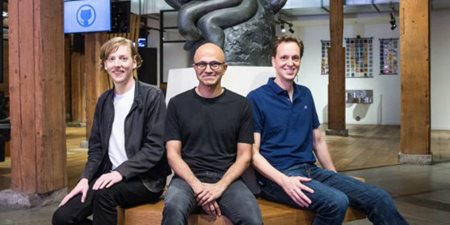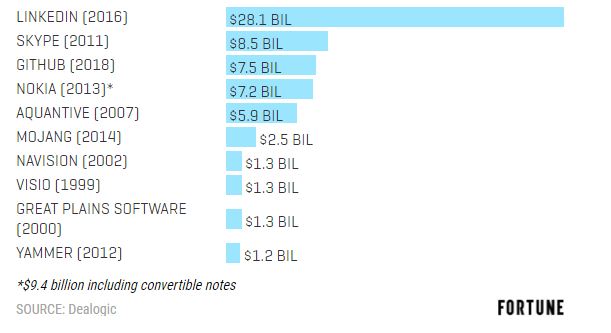Microsoft to Retain "Developer-First Ethos" & Acquire GitHub
By Gabriella Pirrone
June 8, 2018
.NET, acquisition, Agility, Amazon, Azure, BitBucket, developer, Development, GitHub, GitLab, Google, HubSpot, IBM, LinkedIn, Microsoft, Office 365, SAP, SharePoint, Spotify, Telerik
On Monday, Microsoft made an official announcement that they are acquiring GitHub in a deal valued at a casual $7.5 billion.
 GitHub is the world’s leading open-sourced software development platform with more than 28 million developers who learn, share and collaborate together. More than 1.8 million different businesses and organizations use GitHub such as AirBnB, IBM, SAP, Amazon, Spotify, HubSpot and Google just to name a few, for both open source projects and private repositories.
GitHub is the world’s leading open-sourced software development platform with more than 28 million developers who learn, share and collaborate together. More than 1.8 million different businesses and organizations use GitHub such as AirBnB, IBM, SAP, Amazon, Spotify, HubSpot and Google just to name a few, for both open source projects and private repositories.
These two companies coming together will empower developers to achieve more at every stage of the development lifecycle, accelerate enterprise use of GitHub, and bring Microsoft’s developer tools and services to new audiences all around the world.
Satya Nadella, CEO, Microsoft commented on the news to say “Microsoft is a developer-first company, and by joining forces with GitHub we strengthen our commitment to developer freedom, openness and innovation,” he added “We recognize the community responsibility we take on with this agreement and will do our best work to empower every developer to build, innovate and solve the world’s most pressing challenges.”
I was eager to gain an outside perspective and knowing his expertise with Microsoft as a leading industry expert, it was a no-brainer to reach out to Joel Varty, VP of Innovation & Development at Agility to hear his thoughts on the acquisition.
 Why do you think Microsoft and GitHub are a good fit?
Why do you think Microsoft and GitHub are a good fit?
"Microsoft is the biggest contributor to GitHub on a day by day basis. That’s a huge investment of assets – open source or not – and this is Microsoft’s way to protect that asset moving forward. I know that’s a simplistic view, but it works for me. I don’t think we’re going to see GitHub go away, and I expect that it will get a whole lot better."
Satya Nadella, CEO of Microsoft's new mantra is "intelligent cloud, intelligent edge" and the GitHub acquisition will play heavily into that. The cloud is a core priority for developers, and Microsoft is committed to plugging not only its own Azure cloud service into GitHub, but others such as Amazon Web Services (AWS) and Google Cloud Platform as well to help developers code for cloud, mobile, edge computing, and the Internet of Things (IoT). Do you think they will all work seamlessly together?
"Microsoft used to be a company driven by ego: it must run on Windows and it must be .Net and it must be SQL Server. Those days are gone, and the world is better for it. Under Satya Nadella, Microsoft is an organization driven by empathy, and Microsoft is helping to build a global community that includes folks like Google and Amazon. This acquisition is a call to action: we are all in this together and Microsoft is willing to be a good neighbour, now what are you willing to do? I think it’s exciting."
There are lots of developers in the open source community who are concerned about the acquisition and will want the open source collaborative platform of GitHub to work as it stands today. What is your take on this possibility of uncertainty?
"That code is our lifeblood. GitHub has become a centre around which the universe of code spins. I don’t think Microsoft wants to change that, but they certainly will want to leverage it. I trust a Microsoft under Nadella much more than I do a Microsoft of 10 years ago with that kind of responsibility."
The Agility Platform is hosted 100% in the cloud with Microsoft’s Azure Platform, do you think other Enterprises or even Agility will be trusting of the GitHub repository?
"In the coming months we will be migrating all of our developer documentation and putting our web application templates into the open source domain on GitHub. The engineers here at Agility are excited and ecstatic at the thought of folks being able to create the absolute best web apps and share them with folks to be utilized and improved by our community. I hope the industry embraces Microsoft’s acquisition of GitHub and I hope Microsoft continues to operate in a manner that earns and deserves our trust."
I was also curious to take a look back at Microsoft’s acquisition history as they have been on a bit of a buying spree you could say.
The $7.5 billion GitHub acquisition does not trail far behind from the $8.5 billion Skype acquisition in 2011 and Microsoft’s largest acquisition, LinkedIn for $28.1 billion in 2016.

Microsoft is expected to treat the GitHub acquisition similarly to how it treated LinkedIn, meaning it will let it run mostly independently however, there are Microsoft products and services, for example, Visual Studio Team System (VSTS) -- that Microsoft will need to decide how to integrate with GitHub. Although, the acquisition will likely strengthen Microsoft cloud service offeringss and will be able to provide developers with one place to work on their code and host their programs.
Something that I also found interesting is according to Forbes, “GitHub cofounder and CEO Chris Wanstrath will receive as much as $1.5 billion in Microsoft stock. He is GitHub’s single largest shareholder, a source familiar with the company’s finances told Forbes. Wanstrath’s cofounders Tom Preston-Werner and PJ Hyett will walk away with an estimated $1.25 billion and close to $1 billion, respectively.”
Developers Show Signs of Concern
Earlier this week, Sam Basu, a .NET Developer, Microsoft MVP and Progress Developer Advocate for Telerik products, released a very informative article discussing legitimate concerns of Microsoft acquiring GitHub.
As I discussed above with Joel, there seemed to be an ongoing trend with a concern that GitHub used to be an independent tech company for open-source but now developers are worried about the big brother effect and their code being potentially “owned” by Microsoft. There are even users making bold promises to switch to rival services such as GitLab or BitBucket.
In a previous article written by my colleague Venus Tamturk at the beginning of 2018, she highlights Microsoft rolling out their new SharePoint Online Previews for the release of SharePoint 2019 and other SharePoint updates in Office 365.
Venus was also very fortunate to go more in-depth on their inclusion in Gartners Magic Quadrant for DXPs as well as their future plans and product development by gaining exclusive comments from Mark Kashman, Senior Product Marketing Manager for SharePoint.
Early Monday morning, leaked information revealed Microsoft is planning to improve Microsoft Forms, an Office 365 service that allows anyone to easily create surveys to collect customer feedback, measure employee satisfaction, organize team events and more which will now be Google Forms in Q3 2018. The new features within Microsoft will have added features such as insert sections, a progress bar, support for mobile forms, support for folders and plenty more.
Apart from improving the Forms service, Microsoft is also planning to integrate Forms into other various Office products such as Excel, Outlook and more.
By the end of this year, Microsoft is planning to bring Microsoft Forms Preview to general consumers. In 2019, Microsoft will launch Forms as a premium service for general consumers.
Microsoft also announced that they will be releasing its next version of its integrated development environment (IDE) for Visual Studio 2019 since launching previous updates in March 2017. Although, Microsoft did not go into detail about what will be included in the release, or what the new features will be, John Montgomery, Director of Program Management for Visual Studio did comment to say "Because the Developer Tools teams (especially .NET and Roslyn) do so much work in GitHub, you’ll start to see check-ins that indicate that we’re laying the foundation for Visual Studio 2019, and we’re now in the early planning phase of Visual Studio 2019 and Visual Studio for Mac. We remain committed to making Visual Studio faster, more reliable, more productive for individuals and teams, easier to use, and easier to get started with.
Expect more and better refactorings, better navigation, more capabilities in the debugger, faster solution load, and faster builds. But also expect us to continue to explore how connected capabilities like Live Share can enable developers to collaborate in real time from across the world and how we can make cloud scenarios like working with online source repositories more seamless. Expect us to push the boundaries of individual and team productivity with capabilities like IntelliCode, where Visual Studio can use Azure to train and deliver AI-powered assistance into the IDE."
The developer concerns really peaked my interest with this acquisition and over time, it will be interesting to see whether developers will start to flee GitHub from this acquisition.
"We are committed to being stewards of the GitHub community, which will retain its developer-first ethos, operate independently and remain an open platform," said Microsoft's CEO Satya Nadella but will keeping that promise prove trickier than expected?

Gabriella Pirrone
Gabriella is the Digital Marketing Assistant for CMSC Media. She brings a wealth of knowledge from not only a CMS perspective but also content, SEO and eCommerce. She enjoys everything social media and staying ontop of the latest trends in the digital marketing world.